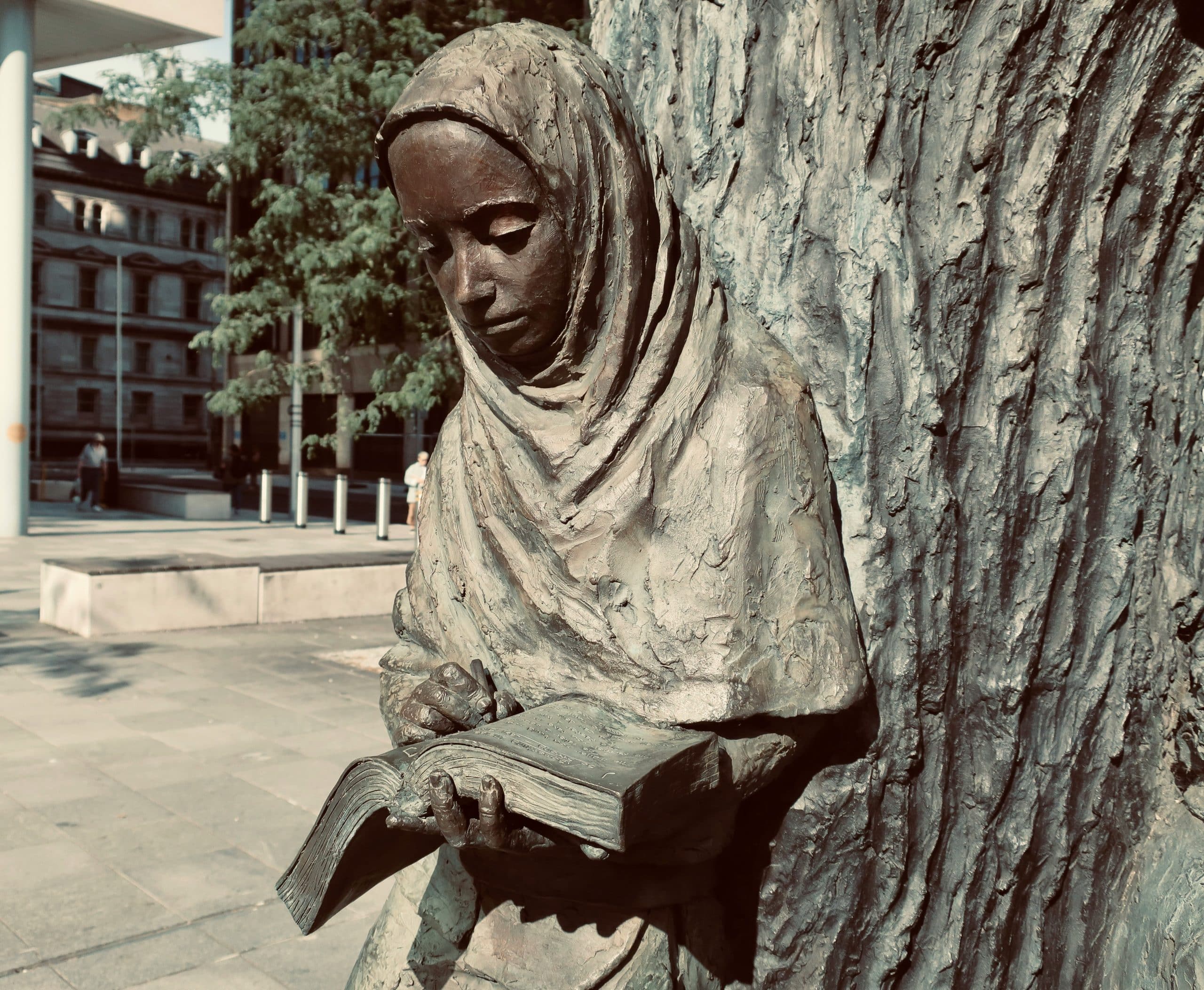#Culture
A New Way To Read Fiction: Critical Islamic Mindful Reading

Published

Many of us love reading fiction for leisure. There’s nothing like curling up with a good book or mindlessly cleaning while listening to an audiobook. However, it’s hard to find “good books” that we can’t wait to rip open and read, and even harder to find books that have some type of “Islamic benefit” in them. Finishing a novel involves investing a considerable amount of time, and time is precious. Sometimes, Muslims may feel guilty for spending so much time reading a fictionalized story instead of engaging in something more “worthwhile;” whether that’s reading a spiritual text or another activity we’d easily call a good deed. Those of us who love to read fiction may find that reading a good story is essential for our mental health. So how can we take a relaxing activity and turn it into something that we may be able to benefit from in this life and the next?
Critical Islamic Mindful Reading: A Reading Approach
As a high school English teacher myself, I never think that reading fiction is simply an exercise of reading comprehension or a “waste of time,” especially when we approach whatever we’re reading mindfully. The biggest reason reading for pleasure can be so valuable is because fiction provides a safe space for us to explore and discuss personal and social issues. Using the characters and the fictionalized story, we don’t have to enter into the world of gossiping or backbiting in order to explore the messiness of life. Having a perspective from within a novel allows us to deeply empathize with the characters and better understand the complexities of the situations they experience.
My mindset of trying to find valuable lessons in whatever I read started when I was a high school student. I would obsessively read all of my assigned novels for school and think–but what does Islam think about these stories and characters? What can I learn from this book to benefit me in my own life? When I got to college, I started asking, what Islamic stories from the Quran and Sunnah does this remind me of?
Keep supporting MuslimMatters for the sake of Allah
Alhamdulillah, we're at over 850 supporters. Help us get to 900 supporters this month. All it takes is a small gift from a reader like you to keep us going, for just $2 / month.
The Prophet (SAW) has taught us the best of deeds are those that done consistently, even if they are small. Click here to support MuslimMatters with a monthly donation of $2 per month. Set it and collect blessings from Allah (swt) for the khayr you're supporting without thinking about it.
These questions are essential to my approach to “critical Islamic mindful reading.” This mindful reading approach is inspired by “sacred reading,” which involves treating a secular, non-religious text similar to a sacred scripture–what does the novel teach you or guide you towards? Obviously nothing compares to the guidance provided by the Quran, so please don’t misunderstand this concept. That is where the critical part of this approach comes in. The ultimate source of wisdom and guidance is Allah 
Getting Started
Once you’ve made some decent progress in the novel or finished it, figure out what major topics the novel explores that you want to spend some time thinking about. Is it patriarchy? Mental health? Sexuality? Racism? Materialism? Now it’s your job to do some research on the side and get your bearings within Islam’s general approach on these topics. What does Islam say about patriarchy? You can look up articles on MuslimMatters, lectures on YouTube, find books, or talk to your learned friends or imam. You may also prepare more detailed questions, such as–does Islam value women’s engagement in society?

PC: freestocks (unsplash)
It’s hard to find a “100% Halal” book, and what does that mean anyway? While I can’t pin down what could be a completely faultless book from an Islamic standpoint, it is relatively easy to determine what content crosses the line too many times or too extravagantly. For example, in Prophet Yusuf’s 
Once you’ve found a book that passes some sort of litmus test, there may still be some problematic moments or undercurrents. As you’re reading the novel and you’re finding objectionable things, note the highly problematic things that go against Islamic teachings and lifestyle. For example, is there an abusive relationship between family members or a character who steals? It’s important to not desensitize ourselves from major sins and to simply call them what they are.
The Method for Critical Islamic Mindful Reading
Here are the three questions that will guide your mindful reading:
- What Islamic stories from the Quran and Sunnah does this remind me of?
- How would Islam address the big questions in the story?
- What can I learn from this book to benefit me in my own life?
Step 1: Similar Stories in the Quran and Sunnah or Your Life
Find something from the Quran or Sunnah related to the story. It can be an example or a non-example.
I’ll give you some examples. In To Kill a Mockingbird, there is a false rape allegation that reminds us a lot of the incident with Prophet Yusuf 



Think about these examples and suss out how they relate to the novel you’re reading. Wonder about what these examples say when you put them in conversation with each other. This level of reflection and pondering might lead you to new insights into familiar Islamic stories, not just a way to think about the novel you’re reading!
Step 2: Islam’s Stance on a Novel’s Big Questions
Tackle the big questions that the novel asks while thinking about what Islam’s answer would be to the same questions. This is a great way for you to make sense of what you’re reading within an Islamic paradigm.
Here are some examples. What would Islam say about the materialism in The Great Gatsby? You may think of multiple parts of the Quran that teach us about the never-ending obsession with the dunya [Surat at Takathur, 102] and the lack of focus on doing good for the Hereafter [Surat al Kahf, 18:46] to come up with your stab at an Islamic answer, or a “thesis statement” or “claim.”
Islam condemns the obsession with materialism in The Great Gatsby as a never-ending pursuit of unquenchable desires for the dunya that not only distracts from but also compromises people’s success in the akhirah.
If you think about the notion of hearts finding ease in their spiritual connection to their Creator [Surat al Raad, 13:28], you may wonder about the pursuits of the characters in The Great Gatsby.
To find peace and satisfaction, Gatsby should focus on his relationship with Allah 
Here’s another (though non-bookish) example. Thinking of the animated Disney film, Encanto, Isabella is being forced into an engagement/marriage that she doesn’t want to be a part of–which is the opposite of what Islam preaches. The consent of the bride is necessary for a valid Islamic marriage and is one of the rights Islam reinforces for women.
The wishes and desires of a young woman regarding major life decisions are something a family should always honor and seek to be aware of through positive family interactions.
Or
Young women can easily be taken advantage of and should be protected and treated with extra care because of their vulnerable position in families and society.
What’s the point of going through this question? It’s using a novel as a case study for real life that allows you to explore messy, complex issues in real life. The world is far from perfect and identifying the Islamic paradigm helps us read mindfully and can protect us when life’s tests become overwhelming.
Step 3: Lessons Learned from the Novel

PC: Ben White (unsplash)
The last thing you’ll want to talk about is the benefits of reading this book as lessons you can take forward with you into your own life. This imbues mindfulness into your “just for kicks” reading and provides you opportunities to develop your own wisdom without having to suffer through the experiences in the novel themselves.
Here are some examples from novels I’ve already mentioned earlier in this post.
Fahrenheit 451: Your spouse may have huge changes or upheavals in their life. It’s important to hear them out and support them, as long as they’re doing something good, to keep the marriage strong.
The Great Gatsby: Don’t put someone in the place of Allah 


Conclusion
I wish you the best as you embark on these exciting literary journeys. You may find yourself shaken to the core at your findings! I hope you can use this mindful reading practice in book clubs and with readings from various media, like movies and podcasts. I pray that critical mindful reading is something you can benefit from and share with others.
Related:
– Navigating Muslim Representation In Books: The Good, The Flawed, And The Ugly
Keep supporting MuslimMatters for the sake of Allah
Alhamdulillah, we're at over 850 supporters. Help us get to 900 supporters this month. All it takes is a small gift from a reader like you to keep us going, for just $2 / month.
The Prophet (SAW) has taught us the best of deeds are those that done consistently, even if they are small. Click here to support MuslimMatters with a monthly donation of $2 per month. Set it and collect blessings from Allah (swt) for the khayr you're supporting without thinking about it.
Meena is a writer, podcaster, high school English teacher, wife, and new mom. She loves working with Muslim youth and is interested in literature, arts, and culture. She studied Comparative Literature and Creative Writing at the University of California, Irvine and has a Master’s in Education from the University of Illinois at Urbana-Champaign. She briefly dabbled in Classical Arabic studies in the US and is also studying the Asharah Qira'aat/10 Recitations. Check out her podcast and website Brown Teacher Reads: the brown literature circle you always wanted to be in. (brownteacherreads.com)


Faith, Identity, And Resistance Among Black Muslim Students

Moonshot [Part 12] – November Evans

From The Prophets To Karbala: The Timeless Lessons Of Ashura For Muslims Today

Moonshot [Part 11] – The Fig Factory

Nationalism And Its Kurdish Discontents [Part II of II]: Kurds And Turkiye After Ottoman Rule

Moonshot [Part 11] – The Fig Factory

Moonshot [Part 12] – November Evans

Moonshot [Part 10] – The Marco Polo

Moonshot [Part 9] – A Religion For Real Life

Nationalism And Its Kurdish Discontents [Part II of II]: Kurds And Turkiye After Ottoman Rule

[Dhul Hijjah Series] Calling Upon the Divine: The Art of Du’a (Part 1)

IOK Ramadan 2025: Four Steps | Sh Zaid Khan

IOK Ramadan 2025: Do Your Best | Sh Zaid Khan

IOK Ramadan 2025: Giving Preference to Others | Sh Zaid Khan




Rameez Rahman
September 21, 2024 at 5:43 PM
Without taking away from your points, I just wanted to recommend reading Wael AbdelGawad’s novels.
They comprise of an Islamic lesson while covering a wide variety of life themes and also are published on Muslim Matters website.